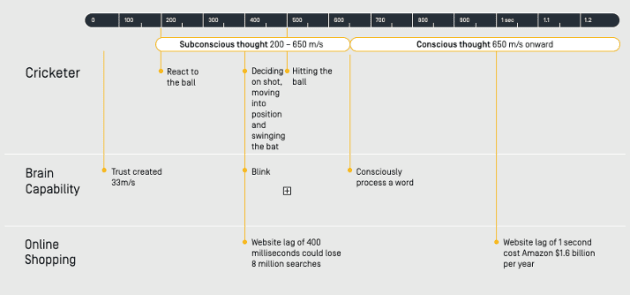
AdNews and innovation agency UDKU take a different look at how decision science can be applied to marketing in this series. Here, we explore subconscious decision-making of sports stars and whether this applies to customers.
In the same amount of time it takes to blink, a cricketer has to pick the trajectory of the ball, decide which shot to play, move into position and then execute. That’s a lot of decisions to make in about the same time it takes us to blink. Funny thing is, your customers make decisions just as quickly. These decisions impact whether the customer makes a purchase or not. Insight from decision sciences shows you how to tip the scales in your favour.
To paraphrase an article written in The Economist ‘How the brain operates in super-fast sports’: a cricket pitch is 20 metres long. A fast bowler hares in and bowls at 145kph. This gives the batsman about 500 milliseconds to pick up the trajectory of the ball, decide which shot to play and then to execute it.
To put that into perspective, it takes 400 milliseconds to blink.
Trust has long been considered to be one of the most important purchase driving attributes. Studies have shown that a customer will decide if they trust someone within the first 33 milliseconds of meeting them. That means your customer has made one of the most important purchasing decisions about your brand, before you’ve even had a chance to speak a word to them.
How is any of this possible?
Well, thanks to the advancements in neuroscience we have been able to map out how we think and make decisions. The chart below outlines just how powerful the subconscious is.
If a batsman were to consciously think about the shot they needed to play they would find themselves back in the pavilion as the ball rattles into their stumps. We don’t realise it, but our subconscious guides the decisions we make every day. Including our purchasing decisions.
Supermarkets know this and leverage the subconscious to influence our purchasing behaviour. It doesn’t make much sense to load up our trolley or basket with fragile fruit and vegetables at the beginning of our trip - other items can damage them. However, because we’ve bought the healthy stuff early on we won’t feel guilty indulging in a few treats later on in our shop. That’s really the tip of iceberg as to how supermarkets influence our subconscious purchasing decisions.
Fortunately, we have scientifically validated tests in place, used to measure subconscious response – oblivious to traditional research methods. Insights from these tests enable us to more accurately predict behaviour.
In 2015, all of the traditional polls predicted a ‘hung parliament’ in the UK. However, three weeks prior to the election a subconscious test predicted the Conservative party would win (and it did). Furthermore, the subconscious polls predicted the number of seats the Conservative party would gain with 99% accuracy.
Decisions are made within the blink of an eye. Understanding how these decisions are made enables us to hit the ball out of the ground. Failure to do so, can mean a poor innings indeed.
By UDKU neuromarketer and senior strategist Arron Child



